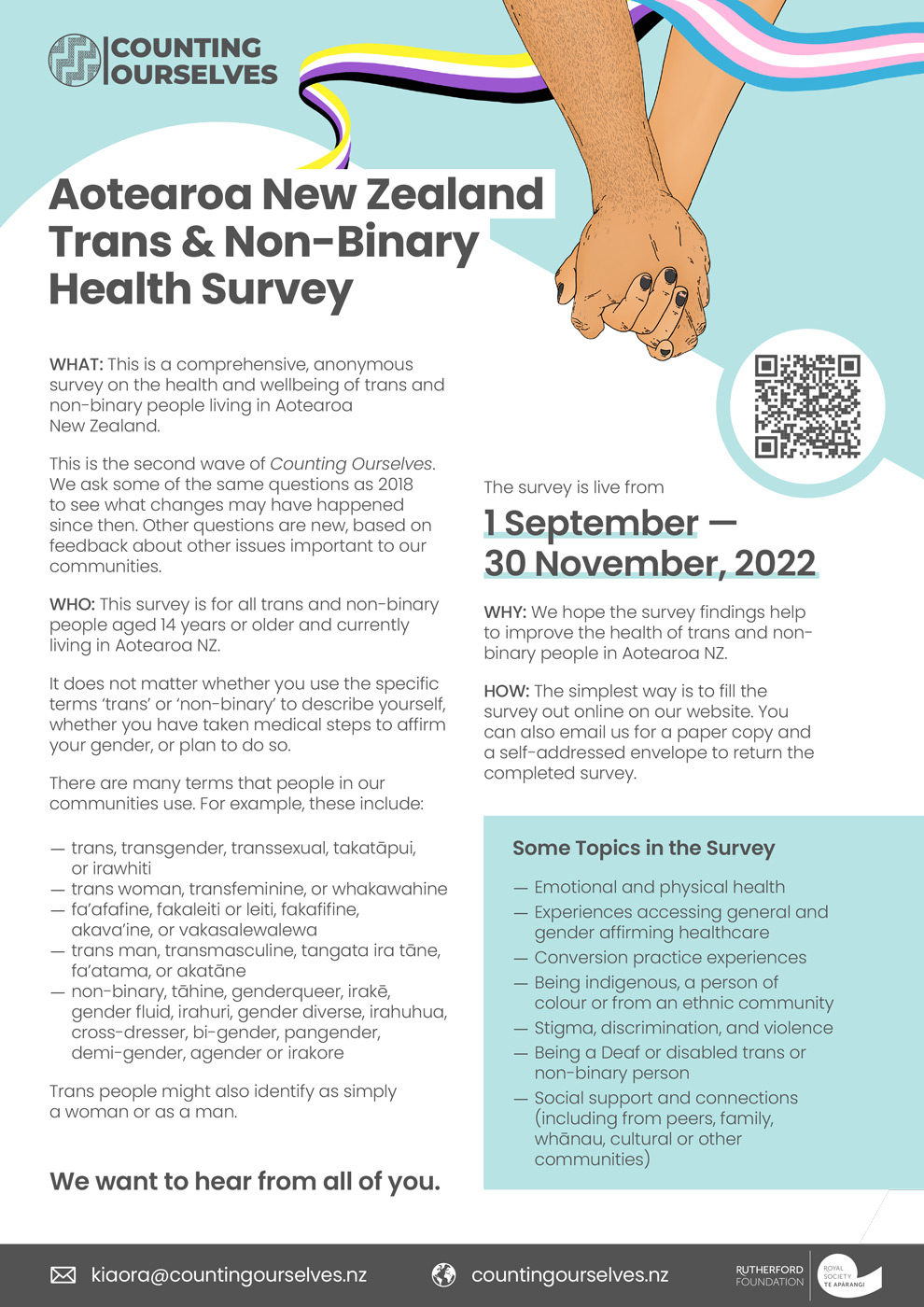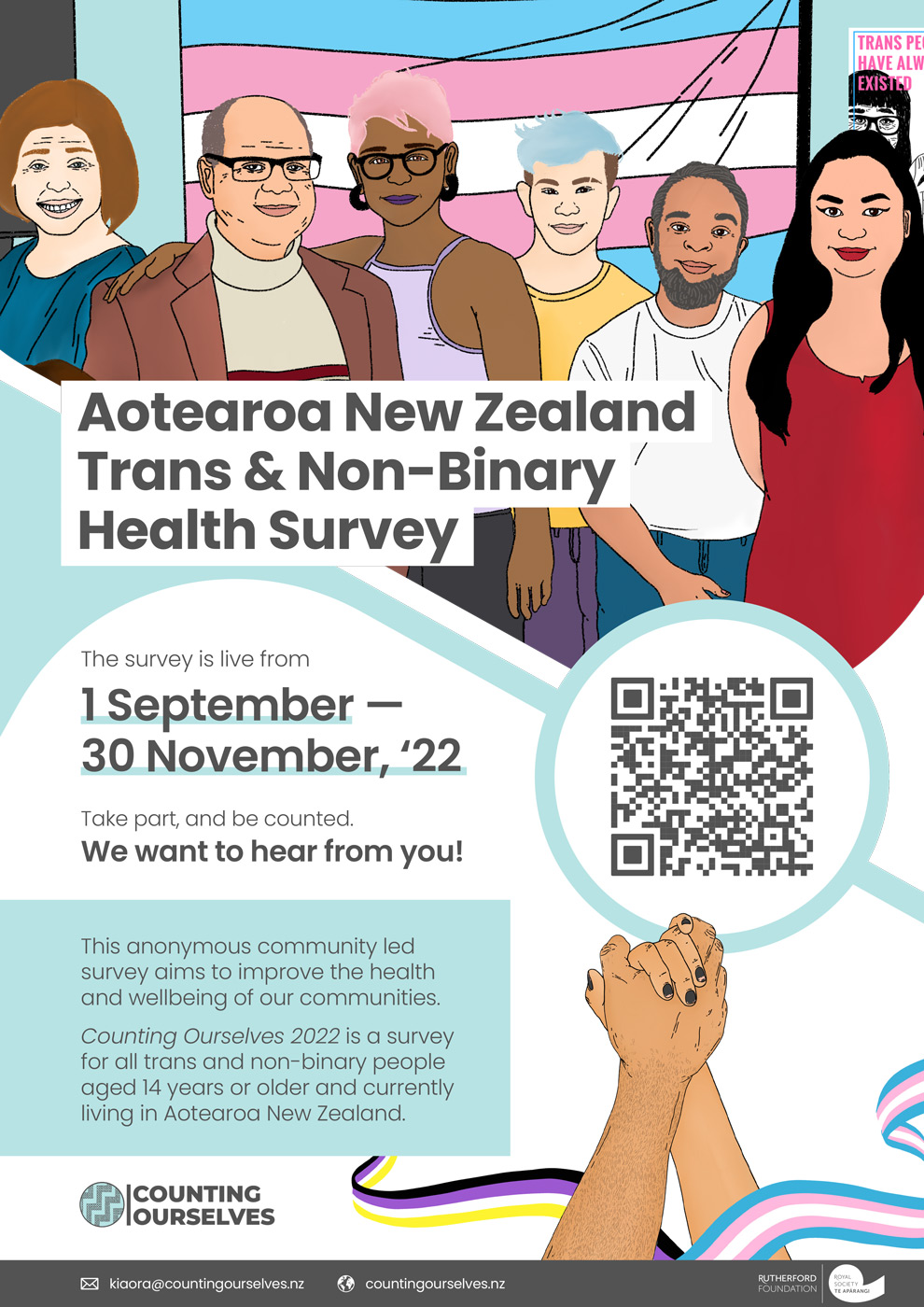2022 survey faq
You can read more details about the 2022 Survey below, or download the full Info Sheet.
What was this survey about?
Counting Ourselves is an anonymous online survey about the health of trans and non-binary people living in Aotearoa New Zealand. It was designed by and for trans and non-binary people.
This survey has collected information that we hope will improve the lives of people in our communities, by showing us:
- how well trans and non-binary people are doing in our mental health and physical health compared to the rest of the population
- the stigma, discrimination, and violence we experience as trans and non-binary people, including when that is compounded by racism or ableism
- any barriers to accessing gender affirming care, such as hormones and surgeries, that we might face
- our experiences in doctors’ clinics, hospitals, and other healthcare settings, which could be for gender affirming care or when we see someone about our general health face
Our first survey in 2018 has been used to advocate for better healthcare for trans people and to change other laws, policies and practices to improve the lives of trans and non-binary people in Aotearoa. Completing this 2022 survey will tell us what has changed since then, including the improvements and ongoing challenges.
Counting Ourselves is informed by Kaupapa Māori research. Below is an extract from Dr Tāwhanga Nopera’s description of what this means for our research.
A Kaupapa Māori informed approach offers non-Māori researchers a hoa haere; an allied pathway towards empowering people’s lives. . . .
A Kaupapa Māori informed approach is committed to including Māori people, our perspectives, voices and strategies as a means to improve life outcomes for people being researched.
Who could take part?
You could take part in this survey if you are:
- trans or non-binary and,
- aged 14 years or older and,
- currently living in Aotearoa New Zealand.
It does not matter whether you use the specific terms ‘trans’ or ‘non-binary’ to describe yourself, whether you have transitioned or even plan to transition. This survey was for anyone whose gender is different from their sex assigned at birth, whatever term you use to describe your identity. There are many terms that people in our communities use. For example, these include:
- trans, transgender, transsexual, takatāpui, or irawhiti
- trans woman, trans feminine, or whakawahine
- fa’afafine, fa’atama, fakaleiti or leiti, fakafifine, akava’ine, or vakasalewalewa
- trans man, transmasculine, tangata ira tāne, fa’atama, or akatāne
- non-binary, tāhine, genderqueer, irakē, gender fluid, irahuri, gender diverse, irahuhua, bi-gender, cross-dresser, pangender, demi-gender, agender or irakore
- Trans people filling out the survey might also identify as simply a woman or as a man
The more people who answered the survey, the stronger the evidence we have to advocate for change. The greater diversity of people who answered, the more we can say about the health needs of people in different parts of the country, at all stages of their life, and for all our identities and communities.
How long did the survey take?
We expected it would take about 70 minutes to complete the survey online. The time taken was less if you skipped some sections or longer if you decided to write more about your experiences.
The survey was this long because there is so little information available about our communities. If you wanted to take a break, you could exit the survey and come back and finish it later. This option worked if you used the same device and browser and had ‘cookies’ enabled in your browser. Our survey software anonymously remembered which response matched your browser and where you were up to.
We really appreciated it if people completed the full survey, but it was totally each person’s choice how far through they went and how many questions they answered.
What are my rights?
- The only questions that you had to answer were the first questions, to check you are trans or non-binary, live in Aotearoa, and are at least 14 years old. After that, you could skip any other questions, for any reason.
- You could withdraw from the survey at any time before submitting it. If you started the survey and then wished to withdraw, you could return to the first page of the survey at any time and tick the option asking for all your responses to be erased.
- The information you provided in this survey is anonymous. We did not collect anyone’s names or any other information that might be able to identify you.
- We did collect your IP address, which is a unique number based on your internet connection. It does not identify you or your physical address. We will only use IP addresses to double check for multiple responses from the same person, and then we will delete all IP addresses.
- We will not publish any results when the number of responses is so small or the comments made are so specific that someone could possibly guess who made them.
- If people contacted us asking for a printed copy of the survey, we delete their contact details once we have posted them the survey. If someone filled out the paper copy of the survey and posted it back to us, we put their answers into the computer and shred their paper survey.
- Everyone’s online responses are stored on password-protected University of Waikato accounts and computers. Only the research team will have access to these.
The Health and Disability Ethics Committee (Southern) granted us ethics approval for this survey (reference 2022 FULL 12683). If you have any ethical concerns about this research, you may phone them on 0800 4 ETHICS or send an email to hdecs@moh.govt.nz.
What types of questions were asked?
Many of these questions have been taken from large New Zealand surveys so that we can compare our experiences against the wider New Zealand population. For most questions, you just needed to select from some ‘tick box’ response options. For some questions, you could write your response in more detail.
We only asked questions about things that are important for our communities to know. Some questions are about difficult topics that might have been hard for people to answer. These include questions about hurting yourself, suicide, and experiences of being treated badly by other people, including emotional, physical, and sexual violence. We let people know when we are about to ask these sensitive questions and gave them the option of ‘skipping’ past these ones without seeing them.
Who can I contact for support?
If you want to talk to someone about some of the sensitive issues raised in the survey, you can text or call 1737 to reach a counsellor 24 hours a day through the National Telehealth Service.
You can also contact OutLine‘s confidential Rainbow helpline every evening from 6pm-9pm
(Phone: 0800 688 5643; Email: info@outline.org.nz).
We listed some other helplines next to specific survey questions too and have a full list on our Support page.
If you have any questions about any aspect of this survey, you can contact the research team by emailing kiaora@countingourselves.nz or by phoning us on 07 837 9216.


